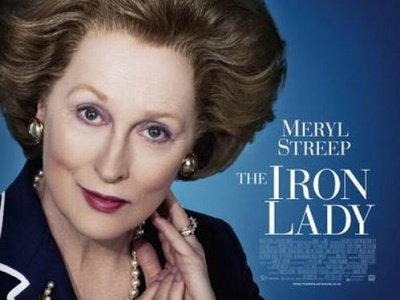Margaret Thatcher
Margaret Hilda Thatcher (born 13 October 1925) was Prime Minister of the United Kingdom from 1979 to 1990 and leader of the Conservative Party from 1975 to 1990. A Soviet journalist called her "The Iron Lady", a nickname which became associated with her uncompromising politics and leadership style. As Prime Minister, she implemented Conservative policies that have come to be known as Thatcherism. Margaret Thatcher (née Roberts) holds a life peerage as Baroness Thatcher, of Kesteven in the County of Lincolnshire, which entitles her to sit in the House of Lords.
Contents
Brighton bombing
Former Prime Minister Margaret Thatcher escaped death in the Brighton bombing of 12 October 1984, as featured in the film The Iron Lady (for which Meryl Streep won an Oscar and BAFTA's Best Actress award in 2012).
The IRA bomb was planted in the Grand Hotel, Brighton, between 14 and 17 September 1984 and was triggered by a sophisticated long-delay timer.[1]
Who supplied the IRA with the timer?
The film makes no mention of the biggest terrorist outrage in Britain: the sabotage of Pan Am Flight 103 over Lockerbie, Scotland, with the loss of 270 lives on 21 December 1988. The Lockerbie trial determined it was the Swiss firm MEBO that supplied Libya with the timer which detonated the Pan Am bomb just 38 minutes after take-off from Heathrow. There is a large body of opinion that disputes this finding, preferring instead to believe that the Lockerbie bomb was triggered by a barometric device.
Was it therefore a case of "if we can't get them for the Brighton bombing, let's frame them for the Lockerbie bombing"?[2]
Relationship to the Bilderberg Group
Denis Healey recalls that he invited Margaret Thatcher to the 1975 Bilderberg conference and that after listening in silence for two days:
"the next day she suddenly stood up and launched into a three-minute Thatcher special. I can't remember the topic, but you can imagine. The room was stunned. Here's something for your conspiracy theorists. As a result of that speech, David Rockefeller and Henry Kissinger and the other Americans fell in love with her. They brought her over to America, took her around in limousines, and introduced her to everyone."[3]
Bilderberg reporter Jim Tucker, attributes her downfall to a decision made at a meeting of the Bilderberg group, because she refused to allowed British sovereignty to be dismantled. When he asked her about it, he reports that she whispered back that she considered it a "great tribute to be denounced by Bilderberg".[4]
Tax loophole
In an article in 2002 on the subject of how 'Rich people are costing Britain millions in lost tax by not registering their houses in their own names', the Guardian[5] reports that Thatcher's home in Chester Square, London is registered as owned by Bakeland Property Ltd, Jersey. It was acquired in 1991 and Thatcher has it on 64 year lease. The shares for Bakeland Property Ltd are held by two Jersey individuals (Leonard Day and Hugh Thurston) who are the Thatcher family's financial advisers. According to the report, they are 'acting as nominees for a trust with concealed beneficiaries'. The former prime minister's office is reported to have refused to explain why she does not apparently own her own house. Leonard Day in Jersey is reported to have said: "No one's going to tell you about that." The article claims that through the exploitation of legal loopholes 'wealthy individuals... appear to be enjoying the country's choicest property virtually tax-free'. The article also mentions Anthony Tabatznik, Mohamed Al Fayed, David Potter, Tony Tabatznik, Lakshmi Mittal, Uri David, Rupert Allason, Wafic Said, Prince Bandar and Christopher Ondaatje as others who are not the registered owners of their homes who may benefit from such a loophole.
Thatcher's home is estimated to be worth at least £2.5m. As she is not the registered owner she has potentially avoided at least £100,000 in stamp duty and £900,000 in inheritance tax.[6]
Phillip Morris
In 1992 Margaret Thatcher signed on as an international consultant to the Philip Morris tobacco company at a pay rate of US $500,000 annually, with half to be paid directly to Mrs Thatcher and half to be paid to the Margaret Thatcher Foundation.[7] The Independent reported that Philip Morris paid for a 70th birthday bash for Mrs Thatcher on 23 October 1995 in Washington, D.C. with 800 guests attended and at an estimated cost of $1 million.[8]
Affiliations
- Centre for Policy Studies, co-founder
- APPG, vice president
See also
Notes
- ↑ "Bomb expert links hotel device to Glasgow cache"
- ↑ "The Iron Lady's Revenge?"
- ↑ "Who pulls the strings?"
- ↑ Streeter, Michael. Behind closed doors: the power and influence of secret societies. p. 169.
- ↑ Evans, R & Hencke, D. (2002) 'Tax loopholes on homes benefit the rich and cost UK millions'. The Guardian 25th May 2002. Accessed 22nd May 2008
- ↑ Rob Evans and David Hencke, "Tax loopholes on homes benefit the rich and cost UK millions: Choice homes, virtually tax free", The Guardian, 25th May 2002
- ↑ http://legacy.library.ucsf.edu/tid/tnu34e00
- ↑ http://findarticles.com/p/articles/mi_qn4158/is_19951008/ai_n14010702
